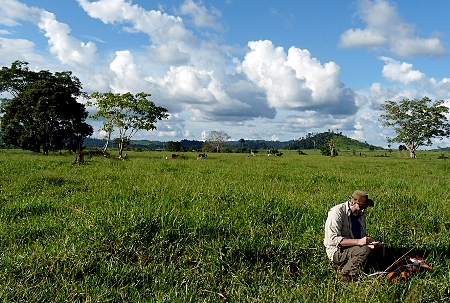Dec 26 2012
Research from an international team of microbiologists, including the University of Oregon's Brendan Bohannan, has revealed a new concern about deforestation in the Amazon rainforest — a troubling net loss in the diversity among the microbial organisms responsible for a functioning ecosystem.
 Brendan Bohannan gathers samples in Brazil
Brendan Bohannan gathers samples in Brazil
The researchers sampled a 100 square kilometer area, about 38 square miles, in the Fazenda Nova Vida study site near Rondônia, Brazil, a location where rainforest has been converted to agricultural use. Their findings in part validated previous research showing that bacteria in the soil became more diverse over the years, as it was converted to pasture.
But their findings also contradicted prior thinking by showing that the loss of restricted ranges for different kinds of bacteria communities resulted in a biotic homogenization and net loss of diversity overall. Scientists worry that the loss of genetic variation in bacteria across a converted forest could reduce ecosystem resilience.
“We have known for a long time that conversion of rainforest land in the Amazon for agriculture results in a loss of biodiversity in plants and animals. Now we know that microbial communities which are so important to the ecosystem, also suffer significant losses,” said Jorge Rodrigues, a biologist at the University of Texas at Arlington and lead author of the study.
The new research is described in a paper appearing online the week of Dec. 24-28 in advance of publication in the Proceedings of the National Academy of Sciences. The paper is called “Conversion of the Amazon rainforest to agriculture results in biotic homogenization of soil bacterial communities.”
Klaus Nüsslein, project director for the published research and associate professor of microbiology at the University of Massachusetts, said the team found important differences between the pasture and forest soil. For example, the number of bacterial species in the pasture soil was higher, but those species were also less related to one another than species in the forest soil.
“The combination of loss of forest species and the homogenization of pasture communities together signal that this ecosystem is now a lot less capable to deal with additional outside stress,” Nüsslein said.
In addition to Rodrigues and Nüsslein, co-authors of the paper were: Babur Mirza, UT Arlington; Vivian Pellizari, Siu Mui Tsai, Brigitte Feigl and Fabiana Paula, the University of Sao Paulo (Brazil); Rebecca Mueller and Brendan Bohannan, University of Oregon; Kyunghwa Baek and George Hamaoui, University of Massachusetts; Ederson da C. Jesus, Embrapa-Agrobiologia (Brazil) and James Tiedje, Michigan State University.
"Our findings are especially important because they support the idea that microbes are impacted by human-caused environmental change," said Bohannan, director of the UO's Institute of Ecology and Evolution. "Land-use change is part of the suite of human-caused environmental changes known as global change. Understanding how microbes respond to such changes is especially important because microbes are responsible for environmental processes that sustain all of life — the recycling of nutrients, the production of clean water, the removal of pollutants and more."
Bohannan noted that the idea that microbes are altered by global change is controversial, and that previous studies have suggested that microbial diversity might respond positively to such changes.
"We found that at the local scale this is true; microbial diversity does increase in response to land use change at the scale of a single soil sample," he said. "But we also found that such changes result in microbial communities becoming more similar across space, resulting in a net decrease in microbial diversity at larger spatial scales — at the scale of tens of kilometers and beyond.
"Most importantly," Bohannan said, "we found that this occurs in part because microbes unique to the forest are displaced when a forest becomes a farm. Such endemic types are especially important in ecosystems, because they have unique characteristics that contribute to an ecosystem's ability to maintain function when the environment changes."
Tiedje said the unique study was done on a scale never previously attempted. "The systematic and large-scale sampling design of this study gave us the power to see the homogenization,” he said.
Scientists on the research team said they hope their work will provide valuable data to those making decisions about the future of the Amazon rainforest.
“The Amazon represents half of the world's rainforest and is home to one-third of Earth's species, yet the Amazon has one of the highest rates of deforestation,” co-authors Pellizari, Tsai and Feigl said in a joint statement. “Agriculture is one of the largest and most dynamic parts of Brazil’s economy, so dealing with standing rainforests in the tropics will be tricky, but nevertheless, it is vital that the issue is tackled.”
Rodrigues said the research team is currently compiling findings about the potential for recovery of the microbial diversity after pastureland is abandoned and returned to secondary forest.
“Whether bacterial diversity will completely recover from ecosystem conversion will depend in part on whether the taxa lost due to conversion are truly locally extinct or whether they are present in the pasture sites but of such low abundance that they are undetectable in our study,” the authors wrote.
The research team’s work was supported by grants from the USDA National Institute of Food and Agriculture, Coordenacao de Aperfeicoamento de Pessoal de Nivel Superior (CAPES) and the Fundação de Amparo à Pesquisa do Estado de São Paulo (FAPESP).
Source: http://www.uoregon.edu/